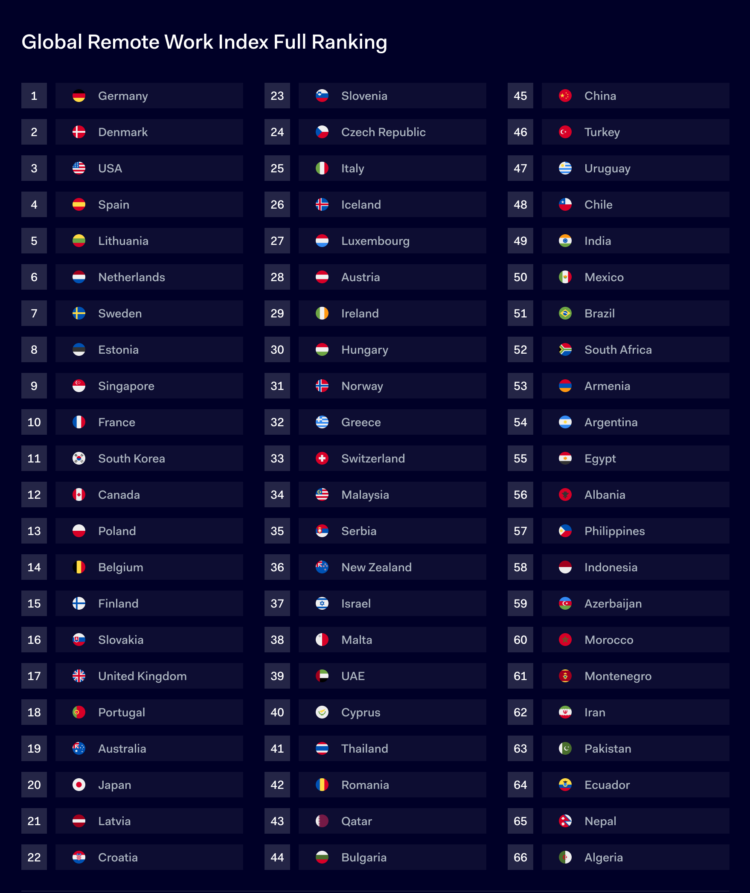
Is Germany becoming a home working paradise? A closer look at remote working
Germany is well prepared for mobile working and there is a willingness to work from home. At least, that is the result obtained by recent studies. At the same time, they highlight what is still missing in terms of ensuring seamless remote and hybrid working – and point out where companies can start.
Home working, workstations, hybrid forms of work – ever since the start of the pandemic, it has been hard to imagine our everyday lives without mobile working. Companies and their employees all over the world have adapted to the new way of working. Meanwhile, outright Zoom towns are emerging in which the proportion of remote workers is particularly high. Germany is even said to be a veritable paradise for remote workers: according to the Global Remote Work Index, Germany ranks first in the world and also within Europe when it comes to the best countries in which to work remotely:

What criteria encourage remote working?
In the index, as per the GRWI methodology, various survey data from 66 countries around the globe were evaluated and analyzed using weighted criteria:
- Cyber security: What is the IT infrastructure like? How are cyber-crime threats dealt with and what is the legal framework?
- Economic & social conditions: How good is the general safety situation, what is the cost of living and health care? To what extent is the infrastructure designed for tourism and travel? What is the level of English proficiency?
- Digital infrastructure: Is there sufficient guarantee of access to the internet and a good quality connection? How widespread is the digital infrastructure, e.g., in education and public administration?
- Covid regulations: What is the vaccination rate? What measures are in place to prevent, detect and report infections, and what is the response capacity?
Germany is out in front in the areas of cyber security (3rd place) and economic and social conditions (5th place). However, it “only” ranks 15th in terms of dealing with Covid and 17th in terms of digital infrastructure. Compared with the other countries surveyed, Germany nevertheless achieves the best overall result. Taking into account that the digital transformation is progressing and that this will improve the digital infrastructure in the future as well as make dealing with Covid a less and less critical factor, the way should be clear for “New Work” in Germany. That said, what does the real situation look like in companies?
Need to catch up with new work concepts and competencies
In fact, the situation is by no means as ideal as the index mentioned above might initially suggest. Based on our experience in customer projects, we know that remote working does not function smoothly everywhere by a long shot. This is also supported by other recent studies such as the one conducted by the Haufe Group here. Around 73% of all respondents and no less than 80% of the managing directors surveyed perceived there to be advantages and opportunities of working from home – so acceptance is there. However, only a quarter of those surveyed said that practical measures were being implemented in their company. The process of equipping employees with laptops and collaboration tools may be largely complete. This is only one side of the coin, however. The flip side is that the corporate culture is a crucial factor: in addition to the technical requirements, mutual trust and good communication are needed for mobile working to function smoothly. When both are in place, the quality of work can be measured by results rather than by 9-to-5 presence in an office.
Training and continuing professional development for virtual and hybrid working, for new forms of collaboration and communication are also necessary in order to ensure that the new way of working can be sufficiently anchored in the company both organizationally and culturally.
Approaching concepts holistically and taking employees with us
What practical steps can companies take? In addition to introducing and expanding a modern digital workplace, it is helpful to involve employees at an early stage. They know what they need for mobile and hybrid working based on their day-to-day work. Combined with the IT requirements, this results in questions that help to develop a concept, e.g.:
Organizational and cultural
- When and where will employees work? Exclusively remote, half the time in the office or other locations?
- Is the new way of working supported and exemplified by the board and management? Do multipliers need to be appointed in a targeted manner?
- How successful are managers in maintaining contact with their team remotely? What new leadership skills are needed?
- How do individuals and teams organize themselves across distances? How do people communicate and collaborate on a day-to-day basis?
- Do processes that work face-to-face need to be adapted for mobile and hybrid working?
- How can the office become a place where employees like to come voluntarily and where they can collaborate with remote colleagues, partners and customers at the same time?
- What needs do individual team members have and how can they be reconciled?
- In addition to training in digital skills, do we also need new team-building formats that improve team cohesion?
Technical
- In addition to laptops and cell phones, what other devices are needed for home working as well as in the office, e.g., monitors, cameras, headsets and lighting?
- Which applications need to be adapted or introduced and how do they integrate into the existing IT landscape?
- What does device management and support look like in the office and remotely?
- How can information, data and applications be accessed remotely?
- What security precautions are necessary to enable a flexible and convenient transition between office, home working and other locations for users?
These are just a few examples of how companies can embrace a concept that fits their culture and ways of working. Ideally, technical and organizational innovations will then go hand in hand and reinforce each other’s impact.
How far along are you in designing and rolling out new working models? In which areas would you like support? Ayda Stommel and her colleagues from the Modern Workplace team will be happy to help you: you can get in touch with them here.